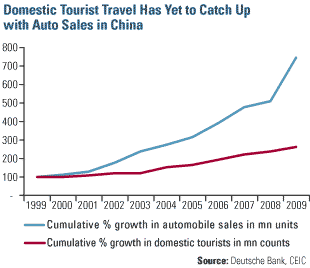 With home and auto purchases growing at an average 34 percent and 22 percent annual pace in the last decade, respectively, Chinese households have already acquired a significant number of material assets.
With home and auto purchases growing at an average 34 percent and 22 percent annual pace in the last decade, respectively, Chinese households have already acquired a significant number of material assets.
Deutsche Bank thinks tourism could be the next major driver for overall consumption in China. In the next five years, in line with the government’s plan, tourism-oriented travel might undergo tremendous expansion, as Chinese consumers opt for more services-related expenditures instead of real estate and durable goods. Tourism revenue is expected to grow by more than 20 percent a year over 2011-2015 versus 14 percent from 2005-2009, according to Deutsche Bank.
There’s plenty of room for the tourism sector to catch up. Growth of domestic tourism in China has lagged auto sales by a cumulative 500 percentage points in the past ten years.
China’s per capita GDP is expected to reach $4,300 this year and $5,000 by 2012, which Deutsche Bank says was a tipping point for Korea and Taiwan, both of which experienced jumps in consumption of services like tourism.
In terms of household expenditures, travel ranks high with Chinese citizens. A CLSA survey from last year revealed that travel ranked number one among planned major expenses during 2010.
In addition, CLSA’s research revealed that nearly 80 percent of middle-class families (there are about 80 million of them) planned to travel domestically during 2010. Fifty-five percent of them planned to travel internationally to locations such as Macau, Hong Kong and Taiwan.
This acceleration in tourism growth should benefit hotels, gaming resorts, travel agencies, airlines and retailers.
All opinions expressed and data provided are subject to change without notice. Some of these opinions may not be appropriate to every investor.



how do u buy a house and car on $100 a month (avg wage in china)? those folks must do some serious budgeting